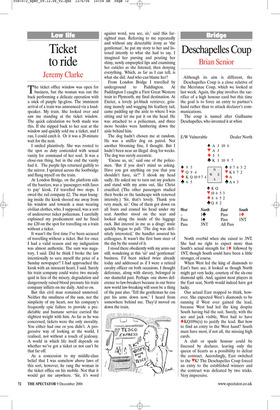Ticket to ride
Jeremy Clarke
The ticket office window was open for business, but the woman was out the back performing a delicate operation with a stick of purple lip-gloss. The imminent arrival of a train was announced via a loudspeaker. My train. She looked over and saw me standing at the ticket window. The quick calculation we both made was this. If she nipped back to her seat at the window and quickly sold me a ticket, and I ran, I could catch it. Or it was a 20-minute wait for the next.
I smiled plaintively. She was rooted to the spot as duty contended with sexual vanity for command of her soul. It was a close-run thing, but in the end the vanity had it. The purple lips returned guiltily to the mirror. I sprinted across the footbridge and flung myself on the train.
At London Bridge, on the platform side of the barriers, was a ‘passengers with fares to pay’ kiosk. I’d travelled two stops. I owed the rail company £2. The man lounging inside the kiosk shooed me away from his window and towards a man wearing civilian clothes, who, I supposed, was a sort of undercover ticket policeman. I carefully explained my predicament and he fined me £20 on the spot for travelling on a train without a ticket.
It wasn’t the first time I’ve been accused of travelling without a ticket. But for once I had a valid reason and my indignation was almost authentic. The sum was nugatory, I said. Did he think I broke the law intentionally to save myself the price of a Sunday newspaper? I had approached the kiosk with an innocent heart, I said. Surely his train company could waive two measly quid in lieu of the misery, degradation and dangerously raised blood pressure his train company inflicts on me daily. And so on.
But this civil man remained unmoved. Neither the smallness of the sum, nor the simplicity of my heart, nor his company’s frequently epic failure to provide a predictable and humane service carried the slightest weight with him. As far as he was concerned, tickets were the only morality. You either had one or you didn’t. A progressive way of looking at the world, I realised, not without a touch of jealousy. A world in which life itself depends on whether we’ve got a ticket or not can’t be that far off.
As a concession to my middle-class belief that I was somehow above laws of this sort, however, he rang the woman in the ticket office on his mobile. Not that it would get me anywhere. ‘Sir, it’s word against word, you see, sir,’ said this farsighted man. Referring to me repeatedly and without any detectable irony as ‘the gentleman’, he put my story to her and listened intently to what she had to say. I imagined her pursing and pouting her shiny, newly empurpled lips and examining her cuticles as she listened, then denying everything. Which, as far as I can tell, is what she did. And who can blame her?
From London Bridge I travelled by underground to Paddington. At Paddington I caught a First Great Western train to Plymouth, my final destination. At Exeter, a lovely jet-black retriever, grinning inanely and wagging his feathery tail, came padding up the aisle to where I was sitting and let me pat it on the head. He was attached to a policeman, and three more besides were lumbering down the aisle behind him.
The dog hadn’t chosen me at random. He was a sniffer dog on patrol. Not another blooming fine, I thought. But I hadn’t been near an illegal drug for weeks. The dog was surely eccentric.
‘Excuse us, sir,’ said one of the policemen. ‘But if you don’t mind us asking. Have you got anything on you that you shouldn’t have, sir?’ I shook my head sadly. He asked me to turn out my pockets and stand with my arms out, like Christ crucified. (The other passengers studied their books or the landscape with renewed intensity.) ‘Sir, that’s lovely. Thank you very much, sir.’ One of them got down on all fours and craned his head under my seat. Another stood on the seat and looked along the inside of the luggage rack. But interest in me as a drugs’ mule quickly began to pall. ‘The dog was definitely interested,’ the handler assured his colleagues. It wasn’t the first bum steer of the day by the sound of it.
I stood there obediently with my arms out still, wondering at this ‘sir’ and ‘gentleman’ business. I’d been nicked twice already today and addressed as if I were a retired cavalry officer on both occasions. I thought deference, along with slavery, belonged in our shameful past. Perhaps one shows deference to law-breakers because in our brave new world law-breaking will soon be a thing of the past also. ‘Tell the gentleman he can put his arms down now,’ I heard from somewhere behind me. They’d moved on down the train.


























































































 Previous page
Previous page